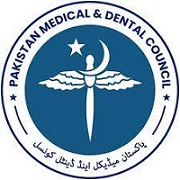Comparison of mean time of achieving full enteral feed with oral erythromycin as compared to placebo for the treatment of gastrointestinal dysmotility in low birth weight preterm neonates.
Abstract
INTRODUCTION: Erythromycin, a commonly used macrolide antibiotic, has been found to possess potent prokinetic properties and therefore enhances gastrointestinal motor activity. Its motilin agonist action has been clinically exploited for the treatment of patients with chronic functional pseudo-obstruction, gastro-oesophageal reflux, postoperative intestinal dysmotility, gastroparesis secondary to diabetes, and scleroderma, and after surgical vagotomy.
OBJECTIVE: The objective of my study is to compare mean time of achieving full enteral feed with oral erythromycin as compared to placebo for treatment of gastrointestinal dysmotility in low birth weight preterm neonates.
MATERIALS AND METHODS:
Study design: Randomized controlled trial.
Setting: Department of paediatrics, Lahore general hospital, Lahore.
Duration of study: This study was conducted for 6 months [December 19, 2017 till June 19, 2018]
DATA COLLECTION PROCEDURE: After approval from hospital ethical committee 100 preterm neonates who presented in the paediatrics neonatal unit and emergency department of LGH fulfilling the inclusion criteria were selected. After an informed consent from the parents, the preterm neonates were randomly allocated to two groups using lottery method into Group A and group-B. Preterm neonates assigned to group A received erythromycin (12.5mg/kg/dose every 6 hour through oral route or nasogastric tube). Those allocated to group B received placebo solution (equivalent volume of normal saline orally 6 hourly). Preterm was given oral feed according to protocol (via nasogastric tube, orogastric tube or oral route). Both groups received erythromycin and placebo for 14 days. If patient developed necrotizing enterocolitis or deteriorated after start of study, erythromycin and placebo solution was discontinued. The duration of achieving full enteral feeding, type of milk used was noted in questionnaire along with demographic details of neonate.
RESULTS: The mean age of all cases was 6.74 ± 2.29 days while mean age in Erythromycin group was 6.66 ± 2.48 days and in placebo group was 6.82 ± 2.10 days. In erythromycin group there were 35(70%) male and 15(30%) female cases while in placebo group there 21(42%) male and 29(58%) female cases. In erythromycin group 19(38%) cases were on mother feeding and 31(62%) cases were formula feeding and in placebo group 23(46%) cases were on mother feeding while 27(54%) cases were on formula feeding. The mean time to achieve enteral feeding in erythromycin group was 23.04 ± 4.42 days and in placebo was 26.46 ± 4.95 days. The mean time to achieve enteral feeding was statistically less in erythromycin group was statistically less as compared to placebo group, p-value < 0.001.
CONCLUSION: The study concludes that the mean time of achieving full enteral feed with oral erythromycin was significantly less as compared to placebo for treatment of gastrointestinal dysmotility in low birth weight preterm neonates. So, therapeutic effects of erythromycin can be utilized to achieve early feeding. This can also help to minimize the related morbidity and hospital stay.
Keywords:
Gastrointestinal dysmotility, preterm birth, prematurity, low birth weight, enteral feeding, oral erythromycin






